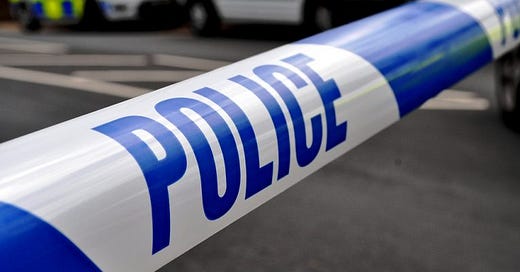Democracy for Sale journalists targeted by secretive police unit
A little-known policing unit is instructing forces to withhold information, track journalists, and rescind previously approved FOI responses.
A secretive policing unit has been advising forces across the UK to block requests for information, including those from investigative journalists at Democracy for Sale.
The ‘Central Referral Unit’ (CRU) has been criticised for instructing local forces to withhold information under laws intended to safeguard access to public records.
Between January and March 2024, the CRU reviewed over 1,700 Freedom of Information (FOI) requests from journalists, researchers, and other requesters.
Internal records show the unit not only advised forces to reject certain requests but also logged requesters’ organisations in a database and discussed blocking responses that would “likely attract media attention.”
Campaigners today condemned the CRU as an “authoritarian censor” and accused the police of attempting to “downplay, hide and rescind information in the public interest.”
One journalist flagged by the CRU was Democracy for Sale reporter Jenna Corderoy. In 2021, she submitted FOI requests about police officers disciplined for misconduct on WhatsApp and other social media platforms, including copies of offending posts. A CRU document identified her as the requester and advised police not to release the posts, stating there was no “fair and lawful purpose” for disclosure. When she requested an internal review, the CRU was consulted again.
In another case, Corderoy sought details on police informants, prompting the CRU to instruct forces to issue a ‘Neither Confirm Nor Deny’ response.
A new BBC investigation has uncovered the extent of the CRU’s operations. The unit has advised police to withhold information on controversial topics such as banned surveillance software and synthetic opioids. It also directed forces to rescind previously granted FOI responses.
John McDonnell MP, condemned the CRU’s actions as emblematic of a broader culture of institutional secrecy.
“This blocking exercise by the police flies in the face of any commitment to openness and transparency and undermines our ability to hold the police service to account,” said McDonnell, who is currently suspended from the parliamentary Labour Party.
The FOI Act came into force in the UK in 2005 and allows anyone to request information from public authorities. But FOI response rates fell to their lowest on record under the Conservatives.
In 2020, Democracy for Sale reporters Peter Geoghegan, Lucas Amin, and Jenna Corderoy - then at the website openDemocracy - exposed that the Cabinet Office was running a covert ‘Clearing House’ unit screening FOI requests and instructing departments to deny information. A parliamentary inquiry led to its dismantling.
Like the Clearing House, the CRU flagged journalists’ requests for additional scrutiny. It advised police on FOI responses and internal review requests from George Greenwood, an investigative reporter at The Times.
The BBC discovered the CRU’s involvement while investigating synthetic opioids. Internal documents show the NPCC press office discussed “Alex from BBC” with the CRU—a reference to a journalist from the BBC Shared Data Unit who had submitted FOI requests.
Initially, 16 police forces provided the BBC with data on opioid-related crimes but later retracted their responses at the CRU’s request, citing national security concerns.
Additional documents obtained by Liberty Investigates show the CRU also instructed forces to withdraw responses about police use of the controversial facial recognition search engine PimEyes. Scotland Yard banned its officers from using PimEyes last year, yet the CRU directed forces to issue ‘Neither Confirm Nor Deny’ responses, citing concerns over potential “negative press.”
Liberty director Akiko Hart said: “It’s incredibly concerning that police have continually tried to downplay, hide and rescind information that is in the public interest.”
Jake Hurfurt, head of research and investigations at Big Brother Watch, said pressuring police forces to retract data was "the practice of an authoritarian censor, not an accountable public body."
In response to the BBC’s findings, Chief Constable Rob Carden, the NPCC’s lead on Digital, Data, and Technology, said that “policing is firmly committed to being open and transparent” .
Carden added that “there are circumstances where information cannot be disclosed and needs to be redacted, and on occasion withheld, to ensure police can continue to use tactics to protect the public or to prevent sensitive information from being exploited by criminals to cause harm. These instances are strictly sanctioned with clear parameters, as set out in legislation.”
Democracy for Sale is working with lawyers to fight government secrecy in court on a number of important cases. If you can, support our work by upgrading to a paid subscription.
And if you’re already a paid subscriber, thank you so much. Your support makes all the difference. Can you forward this to anyone who you think would also like to know about stories like this? We’d really appreciate it, thank you!







The line “policing is firmly committed to being open and transparent” made me spit my coffee. The concept of “policing” is firmly committed; CRU, NPCC, and individual police forces…not so much.
These curtailing of our right to know appear to becoming like tRumps playbook. We must not let fear of the government usurping our rights take over. I support this journalist to the nth degree. If we don't stand up they will have us on our knees just like tRump is doing in the U.S. First they come for the journalists, then the lawyers, then the judges.... and so on and so on. This is England, we have a long history of standing up to oppression I really hope this generation will continue to do so.